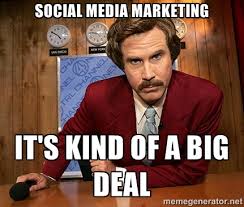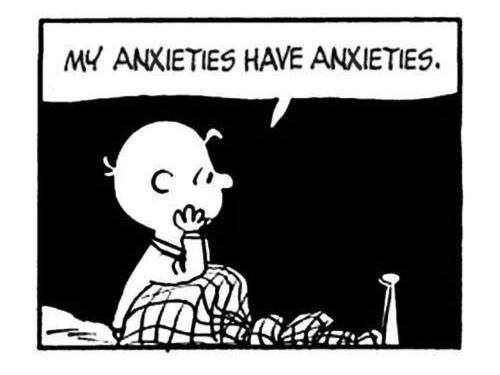Rebuttal: Why Authors SHOULD Use Social Media
This morning an article showed up in my Facebook feed: Why Authors Should NOT Use Social Media. And I get it. It comes from the standpoint that authors can waste too much time on social instead of actually writing their books. Well, that goes without saying. But to completely dismiss social media all together is absolutely insane for an author in today’s world. Social media is an essential part of an author’s marketing toolbox. In the same way that you wouldn’t go back to typing on a typewriter just because a computer can be distracting (dang you, Spider Solitaire!), you shouldn’t abandon social media just because it’s distracting. Truth is, you may just not be doing it right. Read on…
Response to Point #1: Organic Reach is Falling
The article cites falling engagement on Facebook as a reason not to use the platform. They suggest that only 1% of your audience will even see a post you make, adding “the numbers are similar for other social media sites.” They continue: “It takes a lot of time and effort to understand and implement the nuances of social media marketing, and even then you’d be betting on organic reach not dropping even further (which it most likely will).”
Rather than finding contrary statistics, I want to use theirs to make a point. Let’s say you have 1000 followers on Facebook. That means when you make a post, using their numbers, only 10 (1%) will see it. Yeah, not so great.
But wait. Maybe it is. Because you’re not only using Facebook. When you’re promoting your book, you do it the smart way, using every modern tool at your disposal. You’re using a service like socialbee.io (my favorite) to send your post, slightly different, and at different times throughout the day, to ALL your social services. If each one has 1000 followers, now that one post is being seen minimally by 10 people on Facebook, 10 on Twitter, 10 on LinkedIn, 10 on Pinterest, and 10 on Instagram. So now we’ve raised our reach to 5%. But we’re not done yet.
We’ve also posted it on our blog. Which means Google is going to index it for all time. And we’ve sent an email to our list. And we’ve created all this from content that we started on YouTube. So now, that single post is being seen by at least 80 highly-targeted fans who love our work (10 from each avenue). Reach is now 8%.
And we haven’t even started spinning it yet. Now that the blog post is out there, we use a service like MissingLettr to rebroadcast news of that post, in a different manner each time it goes out, to Facebook, Twitter and LinkedIn, ten times over the next year. For those keeping score, that’s 30 more posts. So, using their numbers, we’ve now increased our reach to 38%. Which isn’t bad. Because NO ONE HAS SHARED IT YET!
And, did I mention, that was ONE POST! Imagine what happens when you use this strategy every time you post. Can anyone say, organic reach is rising? You just have to know how social is changing and change with it.
And, by the way, Facebook happens to love live video. You’ll reach more than 1% when you use it. You know what else they love? When you spend ad money to boost your post.
“Oh heavens no! I’d never do that!”
Good. I will. And now I have less competition. You’ve got to play the game if you want to win.
So yes, it does take time and effort. But with the right tools, it doesn’t require near as much of you as you’d think.

Response to Point #2: Your Time is Better Spent Writing
For their second point, they suggest because of how much time the average person spends on social media, if you stop using social media, you could have enough time to write three full-length novels a year.
Look, I get it. If you’re wasting time on social media, you’re not writing. That’s a bad idea. So, write first. Don’t open your browser until you’ve finished your writing for the day. But don’t just abandon social media because it takes self-control. I mean, really.
There’s a telling line in this section: “Perhaps you should leave social media marketing to professionals who can handle it for you.” Um…wait…didn’t we just establish the fact that social media marketing was a waste of time? Why would I pay someone to waste their time on this? Unless it’s not a waste of time after all…

Response to Point #3: Avoid Social Media Anxiety
Next they suggest that social media “can increase your anxiety, and too much anxiety can destroy your creativity and productivity.”
You know what causes me anxiety? A garage full of unsold books because I’ve chosen not to build relationships with my audience through social media. You know who agrees? TCK Publishing, the publisher of this article, who encourages their authors to create “regular content for your fans (this could mean more books, blog posts, social media posts, images, videos, interviews, merchandise, etc.)”
In Conclusion: They Got the 80/20 Rule Wrong
Finally, this article says, “I recommend you follow the 80/20 rule—spend 80% of your time writing and 20% of your time marketing.” Um…that’s not the 80/20 rule.
The 80/20 rule, aka the Pareto Principle, is that 80% of your success comes from 20% of your effort. Or, translated to economics, 80% of your sales (success) will come from 20% of your customers (effort). Customers, by the way, you will only have if you build a relationship with them through the communication channels they’re using. Like social media.

P.S. Reread the first sentence of this rebuttal again…and think about it.




Frustrated?!?
You're not alone, friend! Click here to download our FREE PDF: The Top 10 Ways to Get Noticed by Agents, Editors and Readers. YOU'VE GOT THIS!